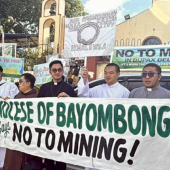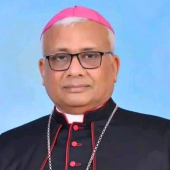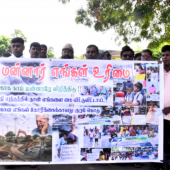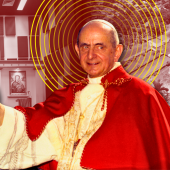Indian Priest gathers 1000 kilos of plastic garbage to care for the environment
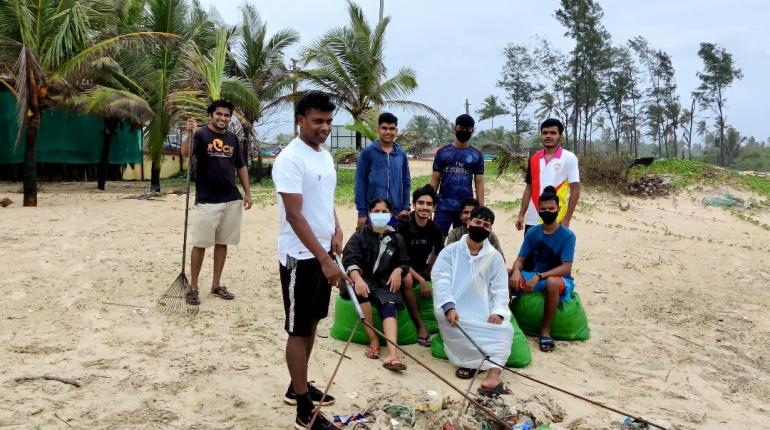
A priest in the Archdiocese of Goa-Daman, western India, is on a cleanliness drive caring for the environment.
Father Milagres Dias, an assistant parish priest at the Holy Trinity Church, along with a group of youth and parishioners, cleared the litter at the Benaulim beach on the coastal belt of Goa.
What prompted him and others was the distressing sight of the huge piles of plastic bags waste and other garbage littering the pristine stretch of Benaulim beach as the monsoon rain was on.
It was the first time the priest observed such garbage in three years since he was appointed at the parish at Benaulim.
He approached the youth to join him. Seven of them started the beach cleaning drive. Later, 45 parishioners, including the youth brigade, assisted him.
“We gathered more than 1,000 kilos of garbage since it was mixed with wet sand,” Fr Dias said.
The volunteers wearing raincoats collected the garbage from the beach stretch along with the parishioners before it was washed back into the sea.
It had to be done quickly, says Pele Fernandes, a fisherman who assisted in the drive, because if the downpour of the monsoon continued for another two days, it would be washed back into the sea in the high tide.
“One hour with the Lord and one hour with nature,” said a 43-year-old Father Dias, sharing his program for a clean environment.
Having grown up in a pristine village in Chorao, Goa, the priest added, “Cleaning the surroundings and keeping it [God’s creation] beautiful is within me.
Father Dias picks up the bottles and plastics lying around and collects them in a bag wherever he goes.
Pointing to the dickey in his car, he said, “I carry waste bags. I like to keep the roads clean. Seeing me, some parishioners also pick up the bottles on the roads and place them in the waste box.”
The priest gently whispers to tourists to keep the village clean.
Father Dias, a popular artist, director, and writer, uses dramas and songs to conscientize people about environmental protection.
He has directed over 13 dramas on various topics such as religion, youth, and environment.
His YouTube video on Benaulim, “Treasure of Riches,” describes the beauty of the village through song and music. Benaulim is the birthplace of Goa’s Saint Joseph Vaz.
The video is calling everyone to save beautiful Benaulim.
“But due to illegal encroachment, rapid urbanization, and improper garbage disposal, the village is in a stinking mark,” said the priest.
Father Dias, with the help of youth, has also planted 55 trees on the parish border.
Some of his volunteers expressed that they are happy to collaborate with the priest for the environmental cause.
Jonathan Barretto, youth from the Benaulim Trinity choir, said, “Garbage has left a stinking mark in most places of Goa and it did not leave our pristine beaches.”
Despite the rains, volunteers managed to clean the stretch of beach along the parish boundary.
“This was not new to us. We used to do it for many years. From this year, we had started cleanliness drives in our village every Sunday. We ended it in April as the second wave of pandemic struck in,” Barretto explained.
Another youth, Konrad Rodrigues said that taking care of the environment is the need of the hour.
He regretted that people destroyed the beauty of the environment by littering in public places, beaches, and roadsides.
“If steps are not taken to control the problem, the tourism industry in Goa will be dimmed.” Rodrigues said, “Tourists cannot visit Goa if it is strewn with filth and garbage everywhere.”
Goa is regarded as an international tourist destination.
Radio Veritas Asia (RVA), a media platform of the Catholic Church, aims to share Christ. RVA started in 1969 as a continental Catholic radio station to serve Asian countries in their respective local language, thus earning the tag “the Voice of Asian Christianity.” Responding to the emerging context, RVA embraced media platforms to connect with the global Asian audience via its 21 language websites and various social media platforms.









